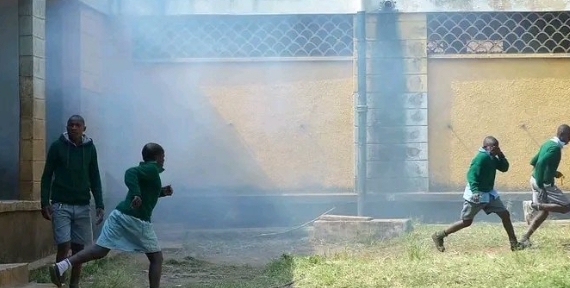Kenya's high-school drama competition sparked controversy after police used tear gas to disperse crowds watching Echoes of War, a play about youth activism. The play, reinstated by the High Court, led to protests from Butere Girls High School students demanding the release of scriptwriter Cleophas Malala. The play's future in the competition remains uncertain amid political tensions.
Police Clash with Students Over Controversial Play at Kenya’s Drama Competition


Kenya's national high-school drama competition became embroiled in controversy this week following a police action that saw tear gas deployed to disperse a crowd gathered to witness a politically charged play. Echoes of War, a production set in a fictional kingdom where the youth are disillusioned with their leaders, depicts battles with the police and draws strong parallels to last year's protests against tax hikes.
Initially disqualified under unclear circumstances, the play was reinstated after a High Court ruling. Tensions flared on Thursday morning in Nakuru when students from Butere Girls High School staged a walkout, demanding the release of the play's scriptwriter, Cleophas Malala, who had been detained by the police.
Malala, a former senator and the author of the play, was prevented from meeting with the performers for final rehearsals the night before. He was later released without charge and expressed his support for the students' protest. "The young girls of Butere Girls have exercised an act of heroic restoration," Malala said after his release, pledging to ensure that the play would be seen by Kenyan audiences.
The students, who briefly sang the national anthem, walked out of the hall in protest, while anti-riot police sealed off the venue. Outside, large crowds had gathered, hoping to watch the play, but they were dispersed by tear gas.
Education Minister Julius Ogamba criticized Malala's involvement in the competition, questioning why a politician was writing for students. Amnesty International condemned the state's actions as part of a broader pattern of political repression. Opposition leader Kalonzo Musyoka also condemned the police for firing tear gas near students, while the opposition Orange Democratic Movement (ODM) demanded that the play be allowed to proceed.
Echoes of War, which portrays a tyrannical ruler suppressing youth activism, resonated with many Kenyans, particularly in the context of ongoing protests by young people calling for better governance. It remains uncertain whether the play will advance to the finals of the competition, which are attended by the president.
This is not the first time Malala’s works have provoked controversy. In 2013, his play Shackles of Doom, also performed by Butere Girls, was banned by the government, but the High Court later ruled in favor of its staging. Malala’s political involvement has grown since then, and his relationship with President William Ruto has become increasingly contentious.

 বাংলা
বাংলা  Spanish
Spanish  Arabic
Arabic  French
French  Chinese
Chinese 
